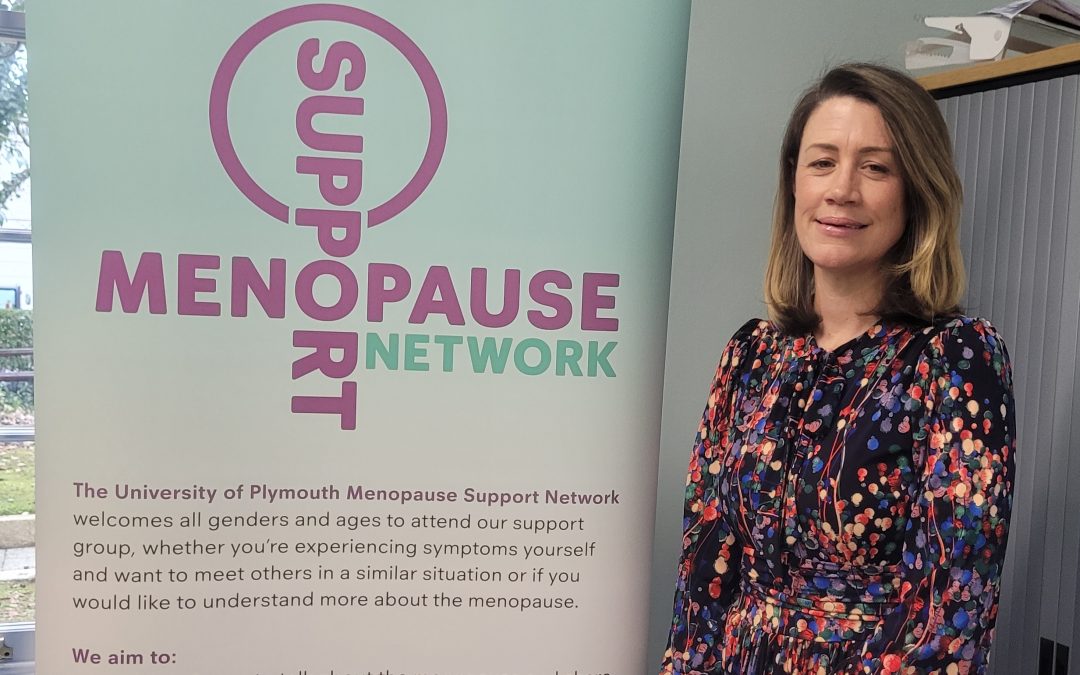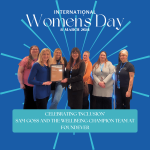For International Women’s Day, Charley Roberts Health Improvement Practitioner and Wellbeing Champion Lead and Shawnie Lea Health Improvement Advisor, part of Wellbeing at Work and Wellbeing Champions, wanted to celebrate the female Wellbeing Champions who are making some amazing changes within their organisations for Wellbeing.
We caught up with several female champions from different organisations all doing a variety of things to ensure that wellbeing is at the forefront of their workplace. Here is our interview with Briony Goldsmith, Health, Safety and Wellbeing Advisor at the University of Plymouth, read more on what Briony has been working on within the University for those affected by the menopause…
Thank you for meeting with us today to celebrate International Women’s Day by recognising your efforts as a Wellbeing Champion in your workplace. We know you have been doing some great work at the University, particularly your work around the menopause, tell us more about that?
“So, we have a lot of networks across the University, a Disability network, Grievance and Bereavement network, LGBTQ forum, VME network and most importantly our Menopause Support Network! I am the chair of the network; and I would say that it is the busiest network within the University because we have high attendance, and we are proactive in what we do. It isn’t just for a meet up and a chat, but we also have a lot of initiatives and other organisations, which come in to speak to us, provide information and support. We are also fortunate at the University because all networks are given a budget, so we can run these initiatives, buy in information, and get other speakers involved.”
“Our Menopause Support Network is also open to men, we welcome all ages, and all genders. It’s not only for those who are affected by the menopause but those who are trying to support their partners/family members or friends who are going through the menopause also.”
It’s great that you can do this through funding and have the support from the university, to help those affected by the Menopause, which is such an important matter to raise awareness about and educate others. How did it all start?
“It all started back in 2019. I was approached by someone in HR, who no longer works here, to create a menopause policy within the University. At the time this was quite a new thing to do. But we did the usual requirements that are needed to create a policy. I created a draft to start the process and then it went out to consultation for others to provide an overview. This normally goes to Union Representatives, Heads of Schools, and Faculties, which we did. But for this policy we did something slightly different… We thought because it is quite a new thing to have a menopause policy within the University, we thought it would be great to ask if employees wanted to come along and consult on the policy also! So, with that, we had so many members of staff that attended the consult! It went really well and soon after went live!”
It is so intuitive, to hear the building blocks of your Menopause Policy and certainly creates a great foundation by getting everyone involved. How well was this received?
“Well, those that attended the consultation, the employees, gave us some great feedback on this and said it was really helpful to be part of the process and see what was going on! With that, they also wanted to continue to meet up as a support group and I thought that was absolutely fine! To begin with, I was initially the organiser of the meetings, but I knew that we had other networks within the university, being able to do so much more because they are an official network and so that would give the Menopause Group recognition from The University Executive Group, which is one of the highest committees at the University! Not only that, but it would also provide us with funding to do more, and most importantly a Chair would be provided allocated time for the network. Making me Chair of the Menopause Support Network was really helpful being able to provide time to do this. Network status was gained really quickly and then the funding also!”
What have you been able to do within the Menopause Support Network since it was created?
“We often work with an organisation called Henpicked and they do Menopause in the Workplace. They come in, run management awareness sessions, which gives managers information on how they can support and guide employees in the workplace going through perimenopause, menopause, and post menopause – they even provide support for family members as well! These sessions are to support and advise management to equip them with the tools to be able to support those in the workplace affected by the menopause.”
“Now, the work we have been doing, it was way before the menopause became a buzz word for celebrities and the media to get involved with. So, with that, we also run colleague sessions to inform them what the menopause is, what happens, the symptoms, the support that you can get to help. This provides our colleagues with the opportunity to have an informed choice and give them information if/when they needed to go the GP for medical support. By having the tools, it helps them feel more confident to say what they need from the GP and fundamentally know what happens to their body when they go through the menopause.”
Why did you think this was important for your colleagues?
“We thought it was important to run these sessions because people always associate the menopause as going through hot flushes, rage, weight gain. But actually, the really significant side effects for working women are the brain fog and the anxiety about losing your confidence to do your job correctly. For instance, if you are a senior member of staff delivering to academics and you’re struggling to find your words or you slept so badly the night before, because of the menopause this will really affect you mentally and not everybody is aware of those symptoms. It’s about educating people to understand that those going through the menopause do not have to live with that and there are things that we can do to improve our quality of life when going through the menopause. It’s about having that informed choice as well, most of us are aware that you can get HRT (Hormone Replacement Therapy), but this might not be for everybody, and we all need to be informed of having a choice.”
Raising awareness of this subject is really important, especially when it comes to getting medical advice and ensuring that others know they have a choice when it comes to support. Have you done anything other initiatives within the network?
“Before we do any projects or have any speakers, we always go out to the network and ask what they’d like to learn or take part in. So, with that we actually had a lot wanting to know more about HRT. With this, we have clinicians come in and run a masterclass. This was a full 2-hour course, going through the ins and outs of HRT, the benefits, and the drawbacks to help people know what would suit them best. We did this, because in despite of everything going through parliament at the moment in relation to the Menopause, our GPs need to have the right knowledge, and some GPs still don’t know everything about it. So, by us giving people the information and it builds their confidence to speak to their GP and ask for the right tools to help.”
“We have also had nutritionists come into the university and spoken about nutrition and menopause, we’ve even had speakers to discuss CBT (Cognitive Behavioural Therapy) and how it can help the menopause! We’ve also spoken to Dietetics, around the science of diet and the menopause, and we have worked with third year students at the university on this, and they have provided one to one support through diet and nutrition consultations. It is really broad what we do within our network, and we always talk to the members first to get their opinions and ideas.”
That’s amazing getting the students involved, their expertise is a real opportunity to support your colleagues but also for the students’ futures. Have you done anything more with students?
“Yes, so medical students on their third year of their degree, they are required to work on a project and a lot are focusing on the menopause at the moment because of it being such a hot topic! This is really brilliant that it is and that they want to get involved with us because they will be the future GPs of the country! In the future when they have a patient come to them about the menopause, they will have an understanding of the impact of the menopause, not just the physical symptoms, but also how it has impacted them on their work-life and mental health, because at the moment one in four women going through the menopause, think about leaving the workplace and that is because it is really difficult.”
It all sounds really exciting! What is your aim within the Menopause Support Network?
“Within this network, our aim is ensuring that those going through the menopause or affected by the menopause feel supported and that they are able to come in and speak to others going through it, find out information and gain support to help them through the menopause. To help with our aim, we have arranged for Henpicked to come in and they will be training up fifteen workplace Menopause Champions! We will use these individuals as beacon ambassadors across the University and to help, we have also created Menopause Support Network flags to stick on their monitors to highlight where they are for others to access, to raise the awareness and get conversations going all over the campus about the menopause! We have done this because there is still so much stigma about menopause in the workplace, they feel like they cannot openly talk about it. Also, I think a lot of people still think it is an ‘old person’ thing but actually for most people from the age of forty onwards will start to get symptoms of perimenopause. We talk about all the other things surrounding female health, but menopause is still not spoken about as much as the others. It is really impactful amongst society, so it needs to be talked about.”
“The fastest growing demographic workplace in the university is women of perimenopausal and menopausal age – so it is definitely a significant business need to provide the support to keep them in the workplace and not lose those valuable employees. Things have changed through the generations, with more women in senior positions, more women working and looking after the family home and also possibly elderly relatives as well. There are so many more pressures on working individuals now, particularly women at menopausal age, it is vastly different to how things used to be for previous generations. It affects women at every level within the workplace, but the more stress you have and responsibility within your role, the more it will impact your physical and mental health.”
How has the journey of the Menopause Support Network been for you and all the members?
“For our members it has been so positive! The feedback that we have got from our sessions and speakers coming in has been brilliant, some individuals have said that this has been life changing for them, with others saying that they didn’t know anything about the menopause, or what their partners and family members were going through. It’s even helped someone acknowledge that the symptoms they were experiencing was actually perimenopause!”
“It’s also been a brilliant journey for us, because we started on it really early, before it became something that everyone is talking about now. Since, we’ve been awarded the Vice Chancellor Award for the work we have done within the network, we have delivered some work with the Plymouth chamber of commerce and supported other organisations who have asked us to get involved in their workplaces such as looking at their menopause policies, signposting them to other organisations and even to come in to have a talk with their colleagues to find out more information. As a university, we have been really progressive and we have been really fortunate to have senior roles within the university also encouraging us on this journey to ensure that we got to where we wanted to go, which has been really valuable.”
You are doing really well, and if you think about it, in today’s society you always hear about the menopause now. The journey you have been on within the network is so inspiring and because you have done all the work before it has been put to the forefront of everyone’s minds, you’ve had those 3 years to learn, develop and secure the support and initiatives for your colleagues which helps with retention within the female workforce of the University.
“I’m really pleased it is out there and spoken about. The University has been as supportive as they can be also, as we have flexible working policies and practices, Occupational Health, and an Employment Assistance Programme that has menopause support within that also. The flexible working is particularly important when it comes to the menopause because not everyone goes through the menopause the same, everyone needs to be treated as individuals so to ensure sickness absences are reduced and work productivity upheld.”
“I know my job isn’t done, but I definitely feel like there is so much here at the university and there is so much positive emphasise behind it that I don’t think it will deplete or go away because it feels like it now embedded into our culture now.”
“It is also important to note that everything that has gone through parliament for the menopause, particularly in January, the government have now agreed to have a Women and Equalities committee and they have put in some proposals for change, some have been accepted and others rejected, but on a positive note the ones that have been accepted like having all GP’s and doctors being trained in the menopause is great and also ensuring that every GP surgery has at least one menopausal specialist or someone who has an interest in it. As well as this, the reduction of prescription costs for things like HRT is brilliant as well. There is certainly a movement for the menopause now, like a snowball effect gathering momentum.”
Thank you, Briony, for meeting with us to celebrate International Women’s Day and speaking with us about your Menopause Support Network that has been so successful within The University of Plymouth. We hope it inspires other Champions and Workplaces to support menopause in the workplace. We look forward to seeing more from you in the future!
The University of Plymouth actively take part in our Wellbeing Champion Programme, currently with 51 Wellbeing Champions! To find out more about the Menopause Support Network click here






